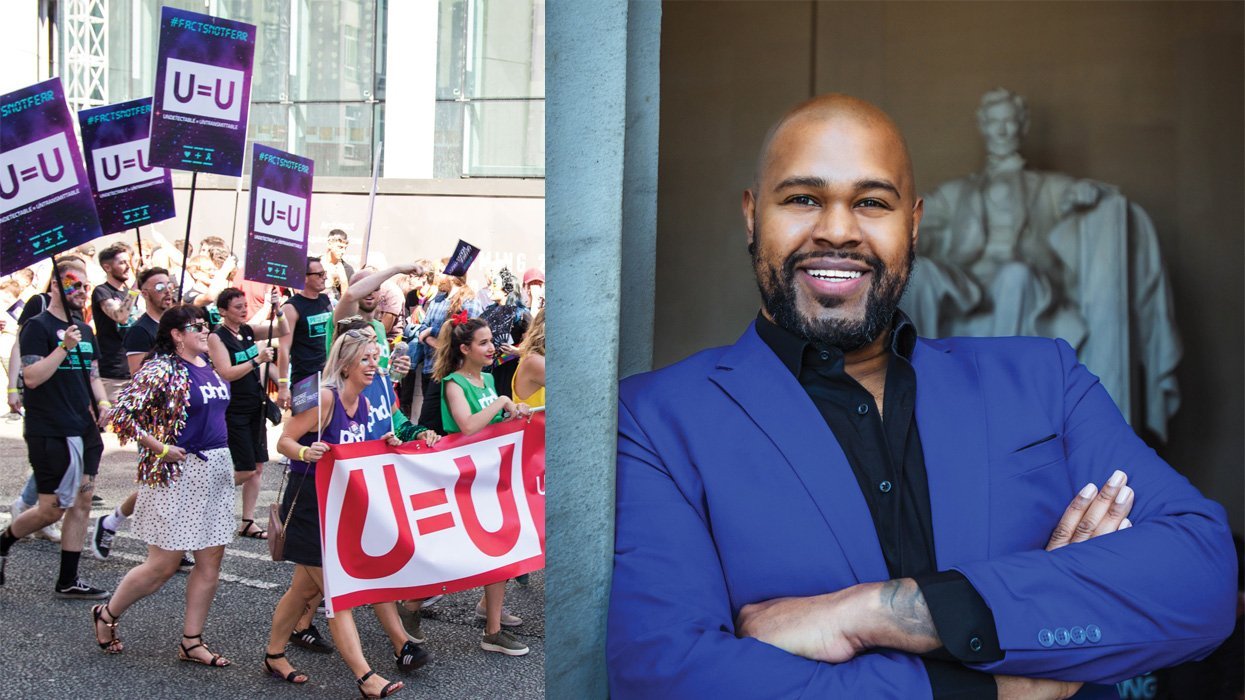
Treatment GuideJust DiagnosedSex & DatingAfrican AmericanStigmaAsk the HIV DocPrEP En EspañolNewsVoicesPrint IssueVideoOut 100
CONTACTCAREER OPPORTUNITIESADVERTISE WITH USPRIVACY POLICYPRIVACY PREFERENCESTERMS OF USELEGAL NOTICE
© 2024 Pride Publishing Inc.
All Rights reserved
All Rights reserved
By continuing to use our site, you agree to our Private Policy and Terms of Use.
I used to work at a residential facility where people frequently said, 'It's not worth losing a T cell over.' They were usually referring to a situation they found troubling but wanted to let go of so that their emotional equilibrium wasn't toppled and their health wasn't compromised. True enough, it has been shown that emotional distress, depression, and anxiety take their toll on the immune system. On a more practical level, it simply doesn't feel very good to be in any of those emotional states. But what does one do with the situation (or person or thing) that troubled one in the first place? What does it mean to 'let go' of something? What does it mean to 'accept' something? The reason I ask these question here is that in my field -- if I am doing my job correctly -- I often ask similarly difficult questions of my clients. While I guide them in their process of self-discovery, I also challenge my clients to reach deeper, to confront issues they'd rather avoid, and to feel things they'd rather not feel. Through it all I validate their feelings and help them explore their options to live differently in the moment. But the thing about such questions like these is that they are far easier to ask than answer. And for some reason it is far easier for me to validate my clients' feelings than for me to validate my own. It requires greater courage for them to take a step in a new direction than it does for me to ask them to do so. Likewise, it takes much more courage for me to ask these questions of myself -- and to try to answer them -- than it does for another to ask them of me. This speaks to what so many therapists -- going all the way back to Sigmund Freud -- have noticed: We would rather maneuver ourselves into a possibly even more precarious situation than confront the painful situation that we are immediately faced with. It's a classic defense mechanism that may provide some relief in the short term but is never productive in the long term. It also speaks to what one of my mentors used to say: 'Don't ask your clients to do something that you yourself are unwilling to do yourself.' In other words, always admire the courage to face one's issues and to make necessary changes, and never presume that it's easy. My issues today tend to be the very same ones that have troubled me for a long time, most of which are linked with my family. Specifically and most immediately, I am still grieving over my mother's death in January 2005. Notice how I use the word 'still.' Even though it's my own personal grief process, I am judging it by some sort of standard that suggests it should be completed. I'm 'still' grieving when I shouldn't be. I beat myself up over the fact that I continue to feel bad about my mom's death, which only adds to my emotional distress. The way I was judging myself became clear to me when speaking recently with a friend, who said, 'You do know that you will never be over it, don't you?' He did for me what I strive to do for all my clients -- say something that is simultaneously challenging and validating. In the past, when I heard statements like 'it's not worth losing a T cell over,' in my mind what I was really hearing was the dismissive 'just get over it.' To me, it implied that one's feelings weren't real and that one needed to simply accept the situation and move. That always struck me as neither realistic nor humane. And when I would try to apply that saying to my life with its negative connotations, I would end up creating in my mind only two painful choices for myself'allowing myself to wallow perpetually in sadness (not 'getting over it') or invalidating my true feelings ('getting over it'). I usually chose the latter, eventually leading to a depression because, well, that's what happens when we suppress our emotions. But I've since learned that I misunderstood the saying 'it's not worth losing a T cell over.' It's not dismissive. It's not antivalidating. Instead, it's about living with integrity and -- as much as possible -- living in the moment. And it is when I truly live in the moment that I can truly and fully experience my emotions, even sadness and grief, and know deep down that my life is not defined by them. Fransen is a licensed clinical social worker who is in private therapy practice in Chicago. He welcomes feedback at stillpoint4003@yahoo.com.
From our Sponsors
Most Popular
The science behind U=U has been liberating people with HIV for years
June 04 2024 3:31 PM
As Pride party season begins, the CDC urges mpox vaccinations
May 16 2024 6:52 PM
Exclusive: We kiki with Q from 'RuPaul's Drag Race'
June 24 2024 11:37 AM
The freedom of disclosure: David Anzuelo's journey through HIV, art, and advocacy
August 02 2024 12:21 PM
The Talk: Thriving with HIV
May 08 2024 10:45 AM
The Talk: What HIV isn’t
May 07 2024 10:48 AM
Activist and philanthropist Bruce Bastian dies at 76
June 26 2024 1:28 PM
In honor of Juneteenth 2024, meet The Normal Anomaly
June 19 2024 1:39 PM
Plus: Featured Video
Latest Stories
AIDS/LifeCycle is ending after more than 30 years
October 17 2024 12:40 PM
Twice-yearly injectable lenacapavir, an HIV-prevention drug, reduces risk by 96%
October 15 2024 5:03 PM
How fitness coach Tyriek Taylor reclaims his power from HIV with self-commitment
September 19 2024 12:00 PM
Out100 Honoree Tony Valenzuela thanks queer and trans communities for support in his HIV journey
September 18 2024 12:00 PM
Kentucky bans conversion therapy for youth as Gov. Andy Beshear signs 'monumental' order
September 18 2024 11:13 AM
Why activist Raif Derrazi thinks his HIV diagnosis is a gift
September 17 2024 12:00 PM
Creator and host Karl Schmid fights HIV stigma with knowledge
September 12 2024 12:03 PM
Study finds use of puberty blockers safe and reversible, countering anti-trans accusations
September 11 2024 1:11 PM
Latinx health tips / Consejos de salud para latinos (in English & en espanol)
September 10 2024 4:29 PM
The Trevor Project receives $5M grant to support LGBTQ+ youth mental health in rural Midwest (exclusive)
September 03 2024 9:30 AM
Introducing 'Health PLUS Wellness': The Latinx Issue!
August 30 2024 3:06 PM
La ciencia detrás de U=U ha estado liberando a las personas con VIH durante años
August 23 2024 2:48 PM
Tratamiento y prevención del VIH por inyección: Todo lo que necesita saber
August 23 2024 2:41 PM
Sr. Gay World quiere asegurarse de que estés bien
August 23 2024 2:30 PM
Eureka is taking a break from competing on 'Drag Race' following 'CVTW' elimination
August 20 2024 12:21 PM
With a new case in Sweden, what is the new mpox outbreak and should you be concerned?
August 15 2024 4:48 PM
Trending stories
Most Recent
Recommended Stories for You

















































































